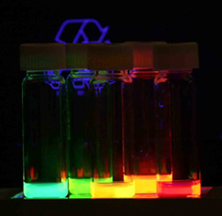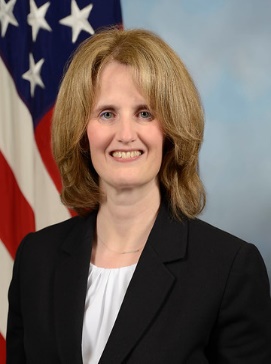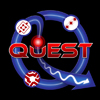
The Defense Advanced Research Projects Agency (DARPA) is a research and development agency of the United States Department of Defense responsible for the development of emerging technologies for use by the military.

The USC Information Sciences Institute (ISI) is a component of the University of Southern California (USC) Viterbi School of Engineering, and specializes in research and development in information processing, computing, and communications technologies. It is located in Marina del Rey, California.
This is a timeline of quantum computing.

Anton Zeilinger is an Austrian quantum physicist and Nobel laureate in physics of 2022. Zeilinger is professor of physics emeritus at the University of Vienna and senior scientist at the Institute for Quantum Optics and Quantum Information of the Austrian Academy of Sciences. Most of his research concerns the fundamental aspects and applications of quantum entanglement.
Quantum networks form an important element of quantum computing and quantum communication systems. Quantum networks facilitate the transmission of information in the form of quantum bits, also called qubits, between physically separated quantum processors. A quantum processor is a machine able to perform quantum circuits on a certain number of qubits. Quantum networks work in a similar way to classical networks. The main difference is that quantum networking, like quantum computing, is better at solving certain problems, such as modeling quantum systems.

The Disruptive Technology Office (DTO) was a funding agency within the United States Intelligence Community. It was previously known as the Advanced Research and Development Activity (ARDA). In December 2007, DTO was folded into the newly created IARPA.

The Intelligence Advanced Research Projects Activity (IARPA) is an organization within the Office of the Director of National Intelligence responsible for leading research to overcome difficult challenges relevant to the United States Intelligence Community. IARPA characterizes its mission as follows: "To envision and lead high-risk, high-payoff research that delivers innovative technology for future overwhelming intelligence advantage."

Jonathan P. Dowling was an Irish-American researcher and professor in theoretical physics, known for his work on quantum technology, particularly for exploiting quantum entanglement for applications to quantum metrology, quantum sensing, and quantum imaging.
Within quantum technology, a quantum sensor utilizes properties of quantum mechanics, such as quantum entanglement, quantum interference, and quantum state squeezing, which have optimized precision and beat current limits in sensor technology. The field of quantum sensing deals with the design and engineering of quantum sources and quantum measurements that are able to beat the performance of any classical strategy in a number of technological applications. This can be done with photonic systems or solid state systems.

Quantum technology is an emerging field of physics and engineering, encompassing technologies that rely on the properties of quantum mechanics, especially quantum entanglement, quantum superposition, and quantum tunneling. Quantum computing, sensors, cryptography, simulation, measurement, imaging, quantum energy generators and space navigation are all examples of emerging quantum technologies. The development of quantum technologies also heavily impacts established fields such as space exploration, the sustainable energy & cleantech sector, nanomanufacturing, semiconductors and laser technology.

Lisa J. Porter is an American scientist and founding Director of the Intelligence Advanced Research Projects Activity. Prior to this position, she was the Associate Administrator for Aeronautics Research at NASA and a senior scientist in the Advanced Technology Office of the Defense Advanced Research Projects Agency.
The Defense Sciences Office (DSO) is one of seven technical offices within DARPA, an agency of the U.S. Department of Defense that is responsible for the development of advanced technology for national security. In a 2021 news story, DARPA described it "a highly exploratory office that identifies and accelerates new technologies."
Charles Tahan is a U.S. physicist specializing in condensed matter physics and quantum information science and technology. He currently serves as the Assistant Director for Quantum Information Science (QIS) and the Director of the National Quantum Coordination Office (NQCO) within the White House Office of Science and Technology Policy. Tahan is also Chief Scientist of the National Security Agency's Laboratory for Physical Sciences.
The Microsystems Technology Office (MTO) is one of seven current organizational divisions of DARPA, an agency responsible for the development of new technology for the United States Armed Forces. It is sometimes referred to as the Microelectronics Technology Office.
John X. J. Zhang is a tenured professor at Thayer School of Engineering of Dartmouth College, and an investigator in the Dartmouth-Hitchcock Medical Center. Before joining Dartmouth, he was an associate professor with tenure in the Department of Biomedical Engineering at the University of Texas(UT Austin). He received his Ph.D. in electrical engineering from Stanford University, California in 2004, and was a research scientist in systems biology at the Massachusetts Institute of Technology (MIT) before joining the faculty at UT Austin in 2005. Zhang is a Fellow of the American Institute for Medical and Biological Engineering (AIMBE), and a recipient of the 2016 NIH Director's Transformative Research Award.

The Quantum Information Science and Technology Program was a five-year, $100M DARPA research program that ran from FY 2001 – 2005. The initiative was jointly created by the Defense Sciences Office (DSO) and the Information Technology Office (ITO) to accelerate development in the field of quantum computing, quantum communications, quantum algorithms, and other high-priority quantum information applications. As a completed program, QuIST received an award from DARPA in 2008 for scientific breakthroughs previously conducted under its support.
Michael J. Biercuk is Professor of Quantum Physics and Quantum technology at the University of Sydney, and the CEO and Founder of Q-CTRL, a venture-capital-backed quantum technology company. In his academic role he is a Chief Investigator in the Australian Research Council Centre of Excellence for Engineered Quantum Systems.

Ronald Hanson is a Dutch experimental physicist. He is best known for his work on the foundations and applications of quantum entanglement. He is Antoni van Leeuwenhoek Professor at the Kavli Institute of Nanoscience at Delft University of Technology and scientific director of QuTech. the Dutch Quantum Institute for quantum computing and quantum internet, founded by Delft University of Technology and the Netherlands Organisation for Applied Research.

Victoria Stavridou-Coleman is currently serving as the 37th Chief Scientist of the United States Air Force. She took her oath of office on April 6, 2021, administered by the Chief of Staff of the United States Air Force, Gen. Charles Q. Brown Jr.











